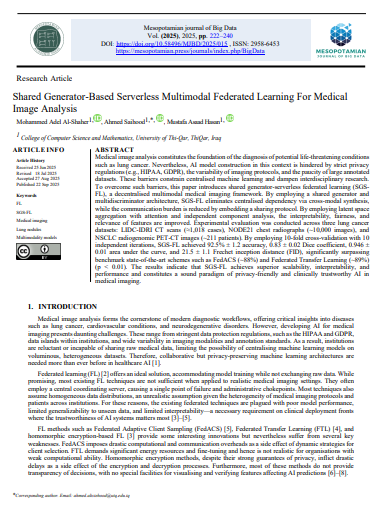Shared Generator-Based Serverless Multimodal Federated Learning For Medical Image Analysis
Main Article Content
Abstract
Medical image analysis constitutes the foundation of the diagnosis of potential life-threatening conditions such as lung cancer. Nevertheless, AI model construction in this context is hindered by strict privacy regulations (e.g., HIPAA, GDPR), the variability of imaging protocols, and the paucity of large annotated datasets. These barriers constrain centralised machine learning and dampen interdisciplinary research. To overcome such barriers, this paper introduces shared generator-serverless federated learning (SGS-FL), a decentralised multimodal medical imaging framework. By employing a shared generator and multidiscriminator architecture, SGS-FL eliminates centralised dependency via cross-modal synthesis, while the communication burden is reduced by embedding a sharing protocol. By employing latent space aggregation with attention and independent component analysis, the interpretability, fairness, and relevance of features are improved. Experimental evaluation was conducted across three lung cancer datasets: LIDC-IDRI CT scans (≈1,018 cases), NODE21 chest radiographs (~10,000 images), and NSCLC radiogenomic PET-CT images (~211 patients). By employing 10-fold cross-validation with 10 independent iterations, SGS-FL achieved 92.5% ± 1.2 accuracy, 0.83 ± 0.02 Dice coefficient, 0.946 ± 0.01 area under the curve, and 21.5 ± 1.1 Frechet inception distance (FID), significantly surpassing benchmark state-of-the-art schemes such as FedACS (~88%) and Federated Transfer Learning (~89%) (p < 0.01). The results indicate that SGS-FL achieves superior scalability, interpretability, and performance and constitutes a sound paradigm of privacy-friendly and clinically trustworthy AI in medical imaging.
Article Details
Issue
Section

This work is licensed under a Creative Commons Attribution 4.0 International License.
